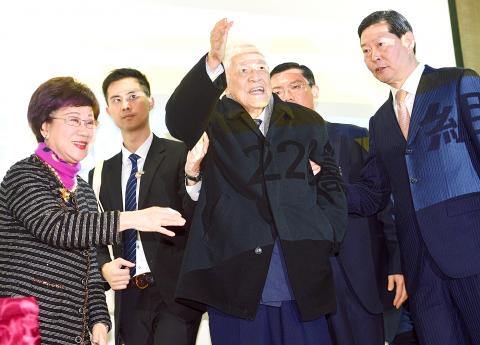A major coalition to campaign for a Taiwanese independence referendum was formed yesterday in what was the highest-level gathering of pro-independence advocates since the Democratic Progressive Party (DPP) administration took office, with former president Lee Teng-hui (李登輝) calling for a new constitution and name for the nation.
The Formosa Alliance (喜樂島聯盟), launched by Formosa TV chairman Kuo Bei-hung (郭倍宏), was joined by Lee, former president Chen Shui-bian (陳水扁), former vice president Annette Lu (呂秀蓮) and former presidential adviser Peng Ming-min (彭明敏), as well as the New Power Party, the Taiwan Solidarity Union, the Social Democratic Party and the Taiwan Radical Wings.
At a news conference in Taipei packed with hundreds of independence supporters, alliance representatives announced plans to formally launch on April 7, the anniversary of late democracy activist Deng Nan-jung’s (鄭南榕) self-immolation in 1989.

Photo: Peter Lo, Taipei Times
It said it would campaign for one year for a referendum, which it wants to hold on April 6 next year.
Taiwan’s sovereignty and political legitimacy come from the authorization of its 23 million people via direct elections and have nothing to do with China, Lee said.
“Although the relationship between Taiwan and China is in a very special state, it is undoubtedly a state-to-state relationship,” Lee said.
This special state is due to a misguided national identity shaped by the Chinese Nationalist Party (KMT) within the Republic of China (ROC) framework, he said, adding that it would require name rectification and a new constitution to formalize Taiwan’s statehood.
Lee said he had proposed the “ROC in Taiwan” framework and completed a series of constitutional amendments during his terms as president as a pragmatic approach to rebuild national identity and make progress on the goal of name rectification and promulgating a new constitution.
“With the Sunflower movement [in 2014] and the KMT’s defeats in 2014 and 2016, I think it is time to take action,” Lee said.
Taiwanese must vote in a democratic referendum to decide Taiwan’s future and make the nation a member of the UN under the name “Taiwan,” he added.
The alliance asked the DPP government to again revise the Referendum Act (公民投票法) to allow the referendum.
The latest amendment, which went into effect on Jan. 3, barred referendums on constitutional changes that would involve redefining the nation’s territory or changing its official title.
“President Tsai Ing-wen (蔡英文) has influenced many DPP lawmakers to ensure that she and the 113 legislators have a tight grip on the right to decide Taiwan’s future and the nation’s destiny,” the alliance said in a statement. “The alliance believes that [Tsai’s] methods are no different than the belief held by some Chinese that they have the right to decide Taiwan’s future and it also constitutes the severest infringement on 23.5 million Taiwanese’s right to self-determination.”

TRAGEDY STRIKES TAIPEI: The suspect died after falling off a building after he threw smoke grenades into Taipei Main Station and went on a killing spree in Zhongshan A 27-year-old suspect allegedly threw smoke grenades in Taipei Main Station and then proceeded to Zhongshan MRT Station in a random killing spree that resulted in the death of the suspect and two other civilians, and seven injured, including one in critical condition, as of press time last night. The suspect, identified as a man surnamed Chang Wen (張文), allegedly began the attack at Taipei Main Station, the Taipei Fire Department said, adding that it received a report at 5:24pm that smoke grenades had been thrown in the station. One man in his 50s was rushed to hospital after a cardiac arrest

A car bomb killed a senior Russian general in southern Moscow yesterday morning, the latest high-profile army figure to be blown up in a blast that came just hours after Russian and Ukrainian delegates held separate talks in Miami on a plan to end the war. Kyiv has not commented on the incident, but Russian investigators said they were probing whether the blast was “linked” to “Ukrainian special forces.” The attack was similar to other assassinations of generals and pro-war figures that have either been claimed, or are widely believed to have been orchestrated, by Ukraine. Russian Lieutenant General Fanil Sarvarov, 56, head

SAFETY FIRST: Double the number of police were deployed at the Taipei Marathon, while other cities released plans to bolster public event safety Authorities across Taiwan have stepped up security measures ahead of Christmas and New Year events, following a knife and smoke bomb attack in Taipei on Friday that left four people dead and 11 injured. In a bid to prevent potential copycat incidents, police deployments have been expanded for large gatherings, transport hubs, and other crowded public spaces, according to official statements from police and city authorities. Taipei Mayor Chiang Wan-an (蔣萬安) said the city has “comprehensively raised security readiness” in crowded areas, increased police deployments with armed officers, and intensified patrols during weekends and nighttime hours. For large-scale events, security checkpoints and explosives

PUBLIC SAFETY: The premier said that security would be tightened in transport hubs, while President Lai commended the public for their bravery The government is to deploy more police, including rapid response units, in crowded public areas to ensure a swift response to any threats, President William Lai (賴清德) said yesterday after a knife attack killed three people and injured 11 in Taipei the previous day. Lai made the remarks following a briefing by the National Police Agency on the progress of the investigation, saying that the attack underscored the importance of cooperation in public security between the central and local governments. The attack unfolded in the early evening on Friday around Taipei Main Station’s M7 exit and later near the Taipei MRT’s Zhongshan